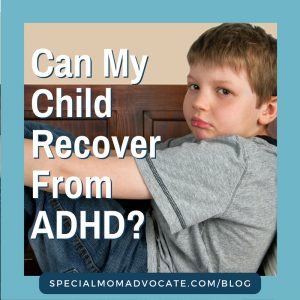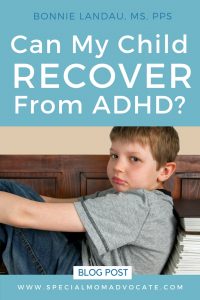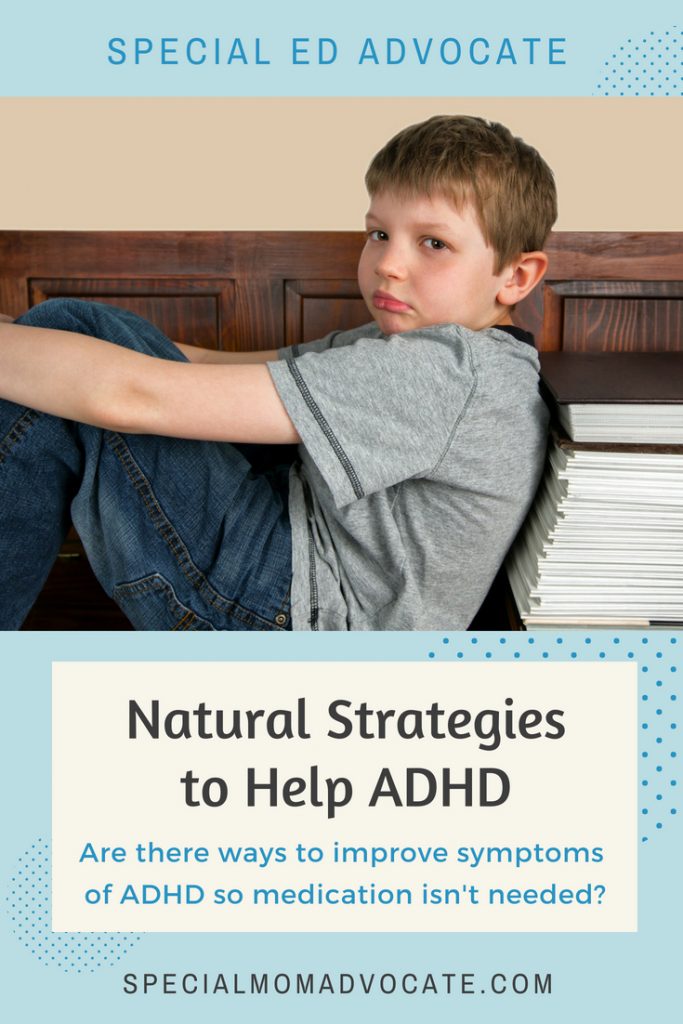 Recovery from ADHD is a heated topic. I know many will disagree with me, but I believe most of the time, a child CAN improve or recover from ADHD symptoms. The reason so many people disagree with this has to do with what most people think Attention Deficit Hyperactivity Disorder really is.
Recovery from ADHD is a heated topic. I know many will disagree with me, but I believe most of the time, a child CAN improve or recover from ADHD symptoms. The reason so many people disagree with this has to do with what most people think Attention Deficit Hyperactivity Disorder really is.
You see, if you say a child has ADHD that impairs his ability to focus, what are you implying is going on in that child’s brain? You think you are saying that the child has a chemical imbalance in the brain that impairs his ability to focus. In medical circles it is assumed the child does not have enough dopamine in the brain to stimulate clear, focused thought. That is why medication is recommended. The medication increases the dopamine and should improve cognition.
The truth is, it ADHD is a diagnosis based on observation. There is no blood test to tell you if the chemical imbalance exists, so the label is given if the child’s behavior and symptoms match the diagnostic criteria. Sometimes they can do a QEEG brain map to help determine if brainwave activity indicates ADHD, but that still does not tell the story of WHY the symptoms are there to start with.
How often is an ADHD diagnosis accurate?
A colleague of mine runs a learning center that specializes in diagnosing and remediating ADHD. He said only 20% of the children who come to their center have a true chemical imbalance in their brain. The other 80% of the time there is SOMETHING ELSE causing the attention difficulties.
Think about that for a moment.
The majority of kids diagnosed with ADHD do NOT HAVE the chemical imbalance that is assumed to be the core cause of the problem. Stunning!
Even Dr. Keith Connors, the original researcher who created the ADHD diagnosis, believes children are being overmedicated. In a 2013 interview he said, “This is a concoction to justify the giving out of medication at unprecedented and unjustifiable levels.” In reference to the rising rate of diagnosis and medicating our children, he said it is “a national disaster of dangerous proportions.”
 But the medication seems to help.
But the medication seems to help.
Medication does help about 20% of the people diagnosed with ADHD. So the theory that there is a chemical imbalance is justified in 1/5 of cases.
Unfortunately there are no longevity studies to examine the long-term affects of taking ADHD meds. The longest study has been 5 years in length, but what happens after 10 or 20 years of stimulant use? Also, there has been research that shows ADHD medications can affect the growth of a child. You can read more about that research on the Harvard Health Publishing website.
It is also common knowledge that the body can develop a tolerance for medication. That means your child may show improvements, but after several years the medication will stop working. Then the process of trial and error has to happen again in order to find a medication that helps. Often no perfect solution is found.
Finally, some medications such as Adderall, are amphetamines and are considered to be the perfect gateway drug. Adderall is actually in the same drug family as meth. They prime the brain for a fix that tolerance often diminishes. That means over time the person starts looking for a more intense drug, and they either increase their medication dose or start looking for recreational drugs to get their brain to feel normal.
So wouldn’t you rather get to the root of the problem and fix it, than having to always look for a new medication that will help?
What can cause ADHD symptoms?
I have counted 23 differential diagnosis for ADHD, including:
- sensory processing disorder
- post-concussive syndrome
- food sensitivities
- dye sensitivities
- vitamin deficiency
- environmental toxicity
- and many others…
This is mind blowing when you really think about it. The first intervention is usually medication. Yet 80% of kids probably have something else going on that is mimicking ADHD. In Chapter 19 of my book, Special Ed Mom Survival Guide, I talk about the steps you need to take to get to the root cause of your child’s learning challenges. I can be done!
My own son was diagnosed with severe (pretty much off the charts) ADHD. He ended up having 3 different conditions that were contributing to his attention and hyperactivity symptoms. As we fixed each problem, the attention and hyperactivity improved. After fixing the third problem, the attention and hyperactivity issues were completely resolved. He now has better focus than most kids his age! We’ll never have to address this issue again, or worry about medication.
So how do you know if your child has a condition that can be helped?
The key to recovering from ADHD symptoms is to ferret out the root problem underlying the difficulties. As a parenting coach to special needs parents, this is what I help you do. Through a series of screenings, questionnaires and history, I help you ascertain what could really be going on under all those symptoms. I then refer you to a specialist to get a firm diagnosis, and then I work with you on planning a path to recovery.
Even if the child has the chemical imbalance, there are therapies and vitamins that can be used to help rectify that imbalance. You can improve the child’s functioning without medication. There is a lot we can do to heal the brain, if we are open to thinking beyond what traditional doctors may suggest. I encourage you to look outside your experience and to consider that there may be a fixable cause to your child’s difficulties.
ABOUT THE AUTHOR:
Bonnie Landau is a professional counselor and holistic therapist in Ventura County, California. Her specialities include therapy for autism, therapy for ADHD, and therapy for parenting who have kids with autism or ADHD or other neurodivergence. She changed careers from graphic design to counseling with the goal of helping struggling parents of kids with ADHD, autism, or other neurodivergence find strategies and solutions to help their children succeed. Bonnie is also the author of Special Ed Mom Survival Guide: How to Prevail in the Special Education Process and Find Life-long Strategies for You and Your Child.



